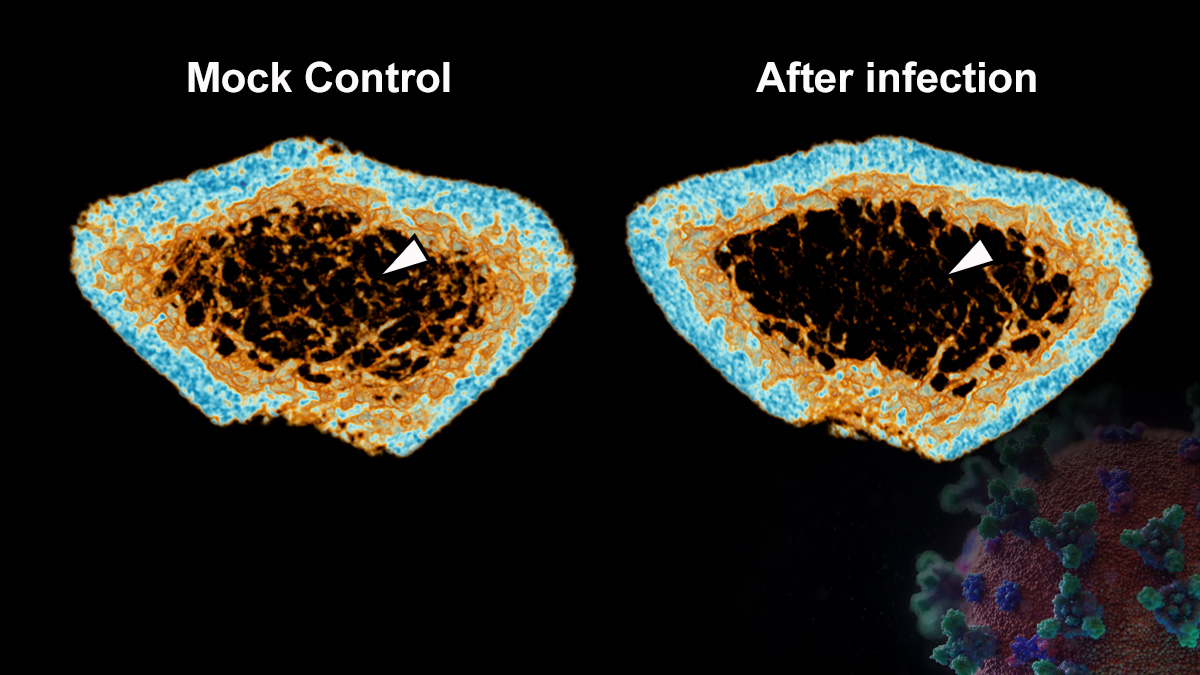19 May 2022
A research team led by Professor Kelvin Yeung Wai-kwok and Dr Jasper Chan Fuk-woo from the LKS Faculty of Medicine, The University of Hong Kong (HKUMed) discovered that SARS-CoV-2 infection can cause inflammatory activation of bone resorption cells, leading to severe bone loss during the acute and post-recovery phases of COVID-19. The findings of this study provide insights into the possible long-term complications of COVID-19 and have been published in the international peer-reviewed journal Nature Communications [Link to the publication].
Background
In addition to pulmonary infection, extrapulmonary complications of different organ systems in the long-term post-acute sequelae of SARS-CoV-2 infection, or ‘long COVID’, have been increasingly recognised in patients with COVID-19. However, the full spectrum of clinical manifestations, especially the influence of SARS-CoV-2 infection on bone metabolism, has yet to be fully understood.
Research methodology and findings
To study the effects of SARS-CoV-2 infection on bone metabolism, Syrian hamsters were intranasally challenged with SARS-CoV-2 and then their bone tissues were collected serially after the infection. Using three-dimensional micro-computerised tomography (μCT) scans, the research team identified that SARS-CoV-2 infection had induced severe bone loss from 20% to 50% progressively in particular to the trabecular bone in the long bones and lumbar vertebrae. This effect extended from the acute phase to the chronic phase of infection. The pathological osteopenia was found to be associated with the inflammatory activation of osteoclasts (a kind of cell responsible for bone resorption). The cytokine dysregulation induced by SARS-CoV-2 not only upregulated osteoclastic differentiation in bone tissues, but also triggered an amplified pro-inflammatory cascade in the skeletal tissues to augment their pro-osteoclastogenesis effects.
Significance of the research
The research team is the first in the world to report the effects of SARS-CoV-2 on bone metabolism using a well-established Syrian hamster model that closely mimics COVID-19 in humans. The findings indicate that the pathological bone loss may be an important but neglected complication, which warrants more extensive investigations during the long-term follow-up of COVID-19 patients.
About the research team
This research was led by Professor Kelvin Yeung Wai-kwok, Professor at the Department of Orthopaedics and Traumatology, and Dr Jasper Chan Fuk-woo, Clinical Associate Professor at the Department of Microbiology, School of Clinical Medicine, LKS Faculty of Medicine, The University of Hong Kong (HKUMed). The first author, Dr Qiao Wei, was a post-doctoral fellow under Professor Yeung’s supervision and is now Clinical Assistant Professor at the Faculty of Dentistry, HKU.
Acknowledgements
This study was supported by the National Key R&D Program of China, Research Grants Council, Health and Medical Research Fund, Hong Kong Innovation Technology Fund, the Consultancy Service for Enhancing Laboratory Surveillance of Emerging Infectious Diseases and Research Capability on Antimicrobial Resistance for Department of Health of the Government of Hong Kong Special Administrative Region, HKU-SZH Fund for Shenzhen Key Medical Discipline, Shenzhen Science and Technology Funding, Sanming Project of Medicine in Shenzhen, Guangdong Financial Fund for High-Caliber Hospital Construction, High Level-Hospital Program of the Health Commission of Guangdong Province, the Major Science and Technology Program of Hainan Province, the research project of Hainan Academician Innovation Platform, the Emergency Key Program of Guangzhou Laboratory, and donations of generous donors.
Media enquiries
Please contact LKS Faculty of Medicine of The University of Hong Kong by email (medmedia@hku.hk).


Follow HKUMed